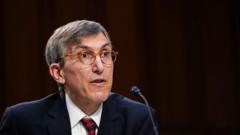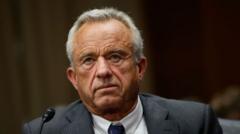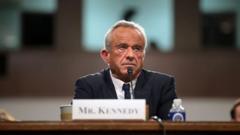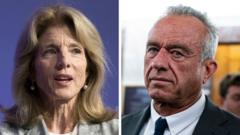As the newly appointed head of the Department of Health and Human Services, RFK Jr. is committed to reforming America's diet, pushing against ultra-processed foods and harmful additives. Despite backing from some health experts, his controversial past and the complexities of food regulation may pose significant challenges to his agenda.
RFK Jr’s Ambitious Agenda: Can he Transform America's Food System?
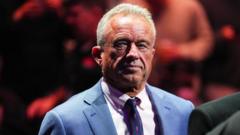
RFK Jr’s Ambitious Agenda: Can he Transform America's Food System?
Robert F. Kennedy Jr. aims to reform the US food industry by eliminating ultra-processed foods, food additives, and enhancing public health standards amidst skepticism from experts.
Robert F. Kennedy Jr. is embarking on an ambitious mission to reshape how Americans consume food and beverages. Serving as President-elect Trump's designated leader of the Department of Health and Human Services (DHHS), Kennedy has committed to dramatically reducing the presence of ultra-processed foods and harmful additives in the nation's diet. From artificial dyes in popular cereals to unhealthy seed oils in fast food, Kennedy has denounced these ingredients, asserting that they jeopardize public health.
"We are betraying our children by letting industries poison them," he declared during a rally after withdrawing his independent presidential bid and endorsing Trump. Acknowledging the formidable presence of Big Food, Kennedy's task may be daunting, as former New York University nutrition professor Marion Nestle noted, "What he's suggesting is taking on the food industry. Will Trump back him up on that? I’ll believe it when I see it."
Despite being a polarizing figure due to his controversial statements—such as claims linking vaccines to autism and alleging that wi-fi causes cancer—Kennedy has garnered some support from both health experts and lawmakers, including Colorado's Democratic Governor Jared Polis. Polis expressed cautious optimism about Kennedy's mission to "Make America Healthy Again," making clear that scientific evidence must underpin health policy.
Kennedy has laid out a vision focused on tackling chronic diseases linked to poor diets, pledging to obliterate ultra-processed foods from school lunches and beyond. He suggests a critical review of the FDA's role in ensuring food safety, citing the need to overhaul an agency plagued by issues of transparency and effectiveness. This entails significant scrutiny of additives banned in other countries.
The former environmental attorney is firm in pursuing his objectives, proposing to terminate employees he believes are part of a “corrupt system” within the FDA. He has notably criticized additives like Red No. 3 and seed oils, claiming they contribute to a public health crisis. Notably, however, the pathway to instigate such changes may be fraught with challenges.
While several public health experts commend Kennedy's goals, they also flag potential drawbacks. For instance, the safety of raw milk and the implications of banning fluoride from drinking water raise concerns about health risks that could emerge from misguided policy shifts. Moreover, expert critiques suggest that Kennedy’s campaign could face significant pushback from the food industry, as well as from factions resistant to altering the established agricultural business model.
Kennedy's proposals hinge on navigating the intricate web of coordination between the USDA and FDA, responsible for regulating food safety in the US. While some of his ideas resonate with efforts to improve national health outcomes, critics caution that implementing radical changes could garner industry resistance and political hurdles.
The Food Industry Association, a sectional representative for food companies, has extended an open hand to work with the administration, aspiring to mold policies grounded in scientific research and reduce regulatory burdens. Revamping America's food landscape is a tall order, but Kennedy's agenda is already stirring considerable discourse, as advocates like Jeff Hutt, from the Make America Healthy Again committee, emphasize the need to prioritize public wellness over corporate profits.
Should Kennedy successfully position himself in the political landscape, experts suggest he could utilize existing frameworks to advocate for nutrition standards and modify dietary guidelines, a move that could have substantial ramifications for food industry practices.
Ultimately, while RFK Jr. has the potential to spark transformational discussions on nutrition and public health, challenges remain—melding his objectives with responsible, science-based regulations will be a defining test of his new role.





